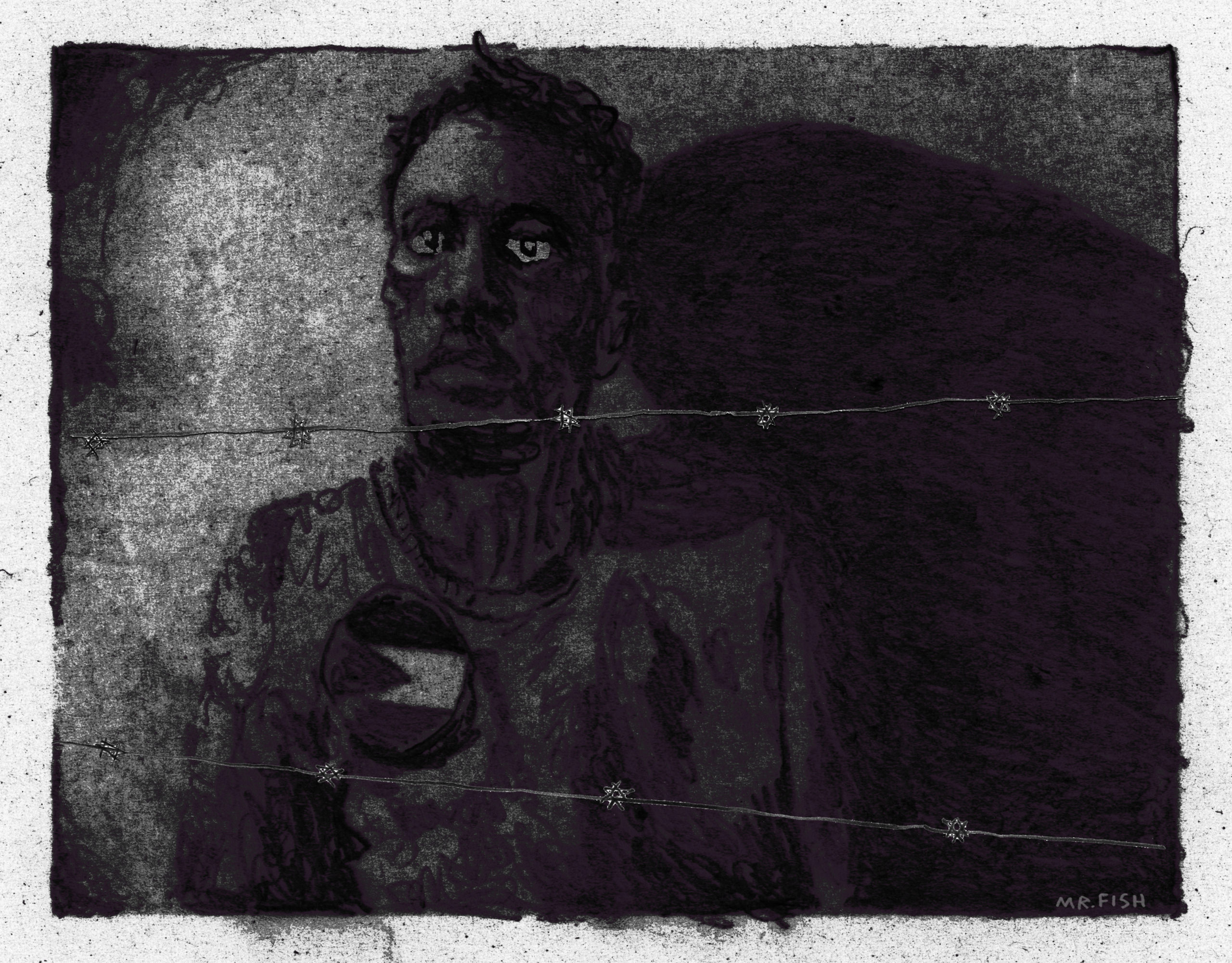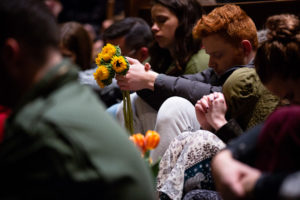The Zionist Colonization of Palestine
For more than a century Zionists and, later, Israelis have pursued a project to seize and ethnically cleanse Palestinian land. Mr. Fish / Truthdig
Mr. Fish / Truthdig
The Israeli-Palestinian conflict is not the product of ancient ethnic hatreds. It is the tragic clash between two peoples with claims to the same land. It is a manufactured conflict, the outcome of a 100-year-old colonial occupation by Zionists and later Israel, backed by the British, the United States and other major imperial powers. This project is about the ongoing seizure of Palestinian land by the colonizers. It is about the rendering of the Palestinians as non-people, writing them out of the historical narrative as if they never existed and denying them basic human rights. Yet to state these incontrovertible facts of Jewish colonization — supported by innumerable official reports and public and private communiques and statements, along with historical records and events — sees Israel’s defenders level charges of anti-Semitism and racism.
Rashid Khalidi, the Edward Said professor of modern Arab studies at Columbia University, in his book “The Hundred Years’ War on Palestine: A History of Settler Colonization and Resistance, 1917-2017” has meticulously documented this long project of colonization of Palestine. His exhaustive research, which includes internal, private communications between the early Zionists and Israeli leadership, leaves no doubt that the Jewish colonizers were acutely aware from the start that the Palestinian people had to be subjugated and removed to create the Jewish state. The Jewish leadership was also acutely aware that its intentions had to be masked behind euphemisms, the patina of biblical legitimacy by Jews to a land that had been Muslim since the seventh century, platitudes about human and democratic rights, the supposed benefits of colonization to the colonized and a mendacious call for democracy and peaceful co-existence with those targeted for destruction.
“This is a unique colonialism that we’ve been subjected to where they have no use for us,” Khalidi quotes Said as having written. “The best Palestinian for them,” Said wrote, “is either dead or gone. It’s not that they want to exploit us, or that they need to keep us there in the way of Algeria or South Africa as a subclass.”
Zionism was birthed from the evils of anti-Semitism. It was a response to the discrimination and violence inflicted on Jews, especially during the savage pogroms in Russia and Eastern Europe in the late 19th century and early 20th century that left thousands dead. The Zionist leader Theodor Herzl in 1896 published “Der Judenstaat,” or “The Jewish State,” in which he warned that Jews were not safe in Europe, a warning that within a few decades proved terrifyingly prescient with the rise of German fascism.
Britain’s support of a Jewish homeland was always colored by anti-Semitism. The 1917 decision by the British Cabinet, as stated in the Balfour Declaration, to support “the establishment in Palestine of a national home for the Jewish people” was a principal part of a misguided endeavor based on anti-Semitic tropes. It was undertaken by the ruling British elites to unite “international Jewry” — including officials of Jewish descent in senior positions in the new Bolshevik state in Russia — behind Britain’s flagging military campaign in World War I. The British leaders were convinced that Jews secretly controlled the U.S. financial system. American Jews, once promised a homeland in Palestine, would, they thought, bring the United States into the war and help finance the war effort. To add to these bizarre anti-Semitic canards, the British believed that Jews and Dönmes — or “crypto-Jews” whose ancestors had converted to Christianity but who continued to practice the rituals of Judaism in secret — controlled the Turkish government. If the Zionists were given a homeland in Palestine, the British believed, the Jews and Dönmes would turn on the Turkish regime, which was allied with Germany in the war, and the Turkish government would collapse. World Jewry, the British were convinced, was the key to winning the war.
“With ‘Great Jewry’ against us,” warned Britain’s Sir Mark Sykes, who with the French diplomat François Georges-Picot created the secret treaty that carved up the Ottoman Empire between Britain and France, there would be no possibility of victory. Zionism, Sykes said, was a powerful global subterranean force that was “atmospheric, international, cosmopolitan, subconscious and unwritten, nay often unspoken.”
The British elites, including Foreign Secretary Arthur Balfour, also believed that Jews could never be assimilated in British society and it was better for them to emigrate. It is telling that the only Jewish member of Prime Minister David Lloyd George’s government, Edwin Montagu, vehemently opposed the Balfour Declaration. He argued that it would encourage states to expel its Jews. “Palestine will become the world’s ghetto,” he warned.
This turned out to be the case after World War II when hundreds of thousands of Jewish refugees, many rendered stateless, had nowhere to go but Palestine. Often, their communities had been destroyed during the war or their homes and land had been confiscated. Those Jews who returned to countries like Poland found they had nowhere to live and were often victims of discrimination as well as postwar anti-Semitic attacks and even massacres.
The European powers dealt with the Jewish refugee crisis by shipping victims of the Holocaust to the Middle East. So, while leading Zionists understood that they had to uproot and displace Arabs to establish a homeland, they were also acutely aware that they were not wanted in the countries from which they had fled or been expelled. The Zionists and their supporters may have mouthed slogans such as “a land without a people for a people without a land” in speaking of Palestine, but, as the political philosopher Hannah Arendt observed, European powers were attempting to deal with the crime carried out against Jews in Europe by committing another crime, one against Palestinians. It was a recipe for endless conflict, especially since giving the Palestinians under occupation full democratic rights would risk loss of control of Israel by the Jews.
Ze’ev Jabotinsky, the godfather of the right-wing ideology that has dominated Israel since 1977, an ideology openly embraced by Prime Ministers Menachem Begin, Yitzhak Shamir, Ariel Sharon, Ehud Olmert and Benjamin Netanyahu, wrote bluntly in 1923: “Every native population in the world resists colonists as long as it has the slightest hope of being able to rid itself of the danger of being colonized. That is what the Arabs in Palestine are doing, and what they will persist in doing as long as there remains a solitary spark of hope that they will be able to prevent the transformation of ‘Palestine’ into the ‘Land of Israel.’ ”
This kind of public honesty, Khalidi notes, was rare among leading Zionists. Most of the Zionist leaders “protested the innocent purity of their aims and deceived their Western listeners, and perhaps themselves, with fairy tales about their benign intentions toward the Arab inhabitants of Palestine,” he writes. The Zionists — in a situation similar to that of today’s supporters of Israel — were aware it would be fatal to acknowledge that the creation of a Jewish homeland required the expulsion of the Arab majority. Such an admission would cause the colonizers to lose the world’s sympathy. But among themselves the Zionists clearly understood that the use of armed force against the Arab majority was essential for the colonial project to succeed. “Zionist colonization … can proceed and develop only under the protection of a power that is independent of the native population — behind an iron wall, which the native population cannot breach,” Jabotinsky wrote.
The Jewish colonizers knew they needed an imperial patron to succeed and survive. Their first patron was Britain, which sent 100,000 troops to crush the Palestinian revolt of the 1930s and armed and trained Jewish militias known as the Haganah. The savage repression of that revolt included wholesale executions and aerial bombardment and left 10% of the adult male Arab population killed, wounded, imprisoned or exiled. The Zionists’ second patron became the United States, which now, generations later, provides more than $3 billion a year to Israel. Israel, despite the myth of self-reliance it peddles about itself, would not be able to maintain its Palestinian colonies but for its imperial benefactors. This is why the boycott, divestment and sanctions movement frightens Israel. It is also why I support the BDS movement.
The early Zionists bought up huge tracts of fertile Palestinian land and drove out the indigenous inhabitants. They subsidized European Jewish settlers sent to Palestine, where 94% of the inhabitants were Arabs. They created organizations such as the Jewish Colonization Association, later called the Palestine Jewish Colonization Association, to administer the Zionist project.
But, as Khalidi writes, “once colonialism took on a bad odor in the post-World War II era of decolonization, the colonial origins and practice of Zionism and Israel were whitewashed and conveniently forgotten in Israel and the West. In fact, Zionism — for two decades the coddled step-child of British colonialism — rebranded itself as an anticolonial movement.”
“Today, the conflict that was engendered by this classic nineteenth-century European colonial venture in a non-European land, supported from 1917 onward by the greatest Western imperial power of its age, is rarely described in such unvarnished terms,” Khalidi writes. “Indeed, those who analyze not only Israeli settlement efforts in Jerusalem, the West Bank, and the occupied Syrian Golan Heights, but the entire Zionist enterprise from the perspective of its colonial settler origins and nature are often vilified. Many cannot accept the contradiction inherent in the idea that although Zionism undoubtedly succeeded in creating a thriving national entity in Israel, its roots are as a colonial settler project (as are those of other modern countries: the United States, Canada, Australia, and New Zealand). Nor can they accept that it would not have succeeded but for the support of the great imperial powers, Britain and later the United States. Zionism, therefore, could be and was both a national and a colonial settler movement at one and the same time.”
One of the central tenets of the Zionist and Israeli colonization is the denial of an authentic, independent Palestinian identity. During the British control of Palestine, the population was officially divided between Jews and “non-Jews.” “There were no such thing as Palestinians … they did not exist,” onetime Israeli Prime Minister Golda Meir quipped. This erasure, which requires an egregious act of historical amnesia, is what the Israeli sociologist Baruch Kimmerling called the “politicide” of the Palestinian people. Khalidi writes, “The surest way to eradicate a people’s right to their land is to deny their historical connection to it.”
The creation of the state of Israel on May 15, 1948, was achieved by the Haganah and other Jewish groups through the ethnic cleansing of the Palestinians and massacres that spread terror among the Palestinian population. The Haganah, trained and armed by the British, swiftly seized most of Palestine. It emptied West Jerusalem and cities such as Haifa and Jaffa, along with numerous towns and villages, of their Arab inhabitants. Palestinians call this moment in their history the Nakba, or the Catastrophe.
“By the summer of 1949, the Palestinian polity had been devastated and most of its society uprooted,” Khalidi writes. “Some 80 percent of the Arab population of the territory that at war’s end became the new state of Israel had been forced from their homes and lost their lands and property. At least 720,000 of the 1.3 million Palestinians were made refugees. Thanks to this violent transformation, Israel controlled 78 percent of the territory of former Mandatory Palestine, and now ruled over the 160,000 Palestinian Arabs who had been able to remain, barely one-fifth of the prewar Arab population.”
Since 1948, Palestinians have heroically mounted one resistance effort after another, all unleashing disproportionate Israeli reprisals and a demonization of the Palestinians as terrorists. But this resistance has also forced the world to recognize the presence of Palestinians, despite the feverish efforts of Israel, the United States and many Arab regimes to remove them from historical consciousness. The repeated revolts, as Said noted, gave the Palestinians the right to tell their own story, the “permission to narrate.”
The colonial project has poisoned Israel, as feared by its most prescient leaders, including Moshe Dayan and Prime Minister Yitzhak Rabin, who was assassinated by a right-wing Jewish extremist in 1995. Israel is an apartheid state that rivals and often surpasses the onetime savagery and racism of apartheid South Africa. Its democracy — which was always exclusively for Jews — has been hijacked by extremists, including current Prime Minister Benjamin Netanyahu, who have implemented racial laws that were once championed mainly by marginalized fanatics such as Meir Kahane. The Israeli public is infected with racism. “Death to Arabs” is a popular chant at Israeli soccer matches. Jewish mobs and vigilantes, including thugs from right-wing youth groups such as Im Tirtzu, carry out indiscriminate acts of vandalism and violence against dissidents, Palestinians, Israeli Arabs and the hapless African immigrants who live crammed into the slums of Tel Aviv. Israel has promulgated a series of discriminatory laws against non-Jews that eerily resemble the racist Nuremberg Laws that disenfranchised Jews in Nazi Germany. The Communities Acceptance Law permits exclusively Jewish towns in Israel’s Galilee region to bar applicants for residency on the basis of “suitability to the community’s fundamental outlook.” The late Uri Avnery, a left-wing politician and journalist, wrote that “Israel’s very existence is threatened by fascism.”
In recent years, up to 1 million Israelis have left to live in the United States, many of them among Israel’s most enlightened and educated citizens. Within Israel, human rights campaigners, intellectuals and journalists — Israeli and Palestinian — have found themselves vilified as traitors in government-sponsored smear campaigns, placed under state surveillance and subjected to arbitrary arrests. The Israeli educational system, starting in primary school, is an indoctrination machine for the military. The Israeli army periodically unleashes massive assaults with its air force, artillery and mechanized units on the largely defenseless 1.85 million Palestinians in Gaza, resulting in thousands of Palestinian dead and wounded. Israel runs the Saharonim detention camp in the Negev Desert, one of the largest detention centers in the world, where African immigrants can be held for up to three years without trial.
The great Jewish scholar Yeshayahu Leibowitz, whom Isaiah Berlin called “the conscience of Israel,” saw the mortal danger to Israel of its colonial project. He warned that if Israel did not separate church and state and end its colonial occupation of the Palestinians it would give rise to a corrupt rabbinate that would warp Judaism into a fascistic cult. “Religious nationalism is to religion what National Socialism was to socialism,” said Leibowitz, who died in 1994. He saw that the blind veneration of the military, especially after the 1967 war in which Israel captured the West Bank and East Jerusalem, would result in the degeneration of the Jewish society and the death of democracy.
“Our situation will deteriorate to that of a second Vietnam [a reference to the war waged by the United States in the 1970s], to a war in constant escalation without prospect of ultimate resolution,” Leibowitz wrote. He foresaw that “the Arabs would be the working people and the Jews the administrators, inspectors, officials, and police — mainly secret police. A state ruling a hostile population of 1.5 million to 2 million foreigners would necessarily become a secret-police state, with all that this implies for education, free speech and democratic institutions. The corruption characteristic of every colonial regime would also prevail in the State of Israel. The administration would have to suppress Arab insurgency on the one hand and acquire Arab Quislings on the other. There is also good reason to fear that the Israel Defense Force, which has been until now a people’s army, would, as a result of being transformed into an army of occupation, degenerate, and its commanders, who will have become military governors, resemble their colleagues in other nations.”
The Zionists could never have colonized the Palestinians without the backing of Western imperial powers whose motives were tainted by anti-Semitism. Many of the Jews who fled to Israel would not have done so but for the virulent European anti-Semitism that by the end of World War II saw 6 million Jews murdered. Israel was all that many impoverished and stateless survivors, robbed of their national rights, communities, homes and often most of their relatives, had left. It became the tragic fate of the Palestinians, who had no role in the European pogroms or the Holocaust, to be sacrificed on the altar of hate.
Your support is crucial…With an uncertain future and a new administration casting doubt on press freedoms, the danger is clear: The truth is at risk.
Now is the time to give. Your tax-deductible support allows us to dig deeper, delivering fearless investigative reporting and analysis that exposes what’s really happening — without compromise.
Stand with our courageous journalists. Donate today to protect a free press, uphold democracy and unearth untold stories.






It never fails to amaze me how American boobs can read facts such as offered in this article, and still support this apartheid state. ( I guess that is just what makes this country so great!)